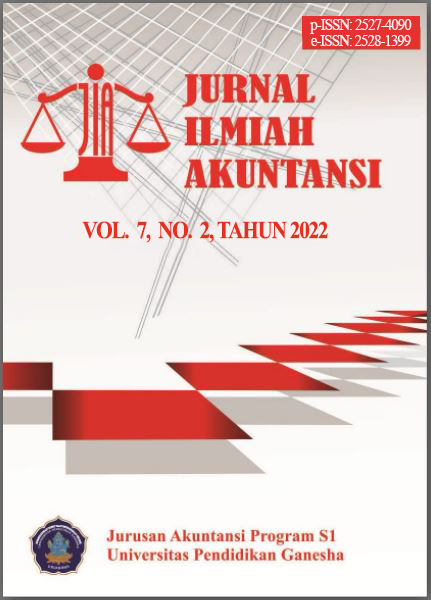Corporate Social Responsibility of Five-Star Hotels in Bali
DOI:
https://doi.org/10.23887/jia.v7i2.49640Keywords:
CSR activities, CSR management strategies, local community perceptionsAbstract
This study aims at describing the CSR of five-star hotels in Bali, analyze the perceptions of the surrounding community towards hotel CSR and provide recommendations for CSR strategies for hotels based on the GRI Standards and local community perceptions. Respondent samples were selected using purposive sampling and data in the study were collected using interviews, documentation and questionnaires. This study uses an interactive model of qualitative data analysis techniques. The results of the study prove that: for the CSR the five-star hotels in Bali do not have an autonomous sector and do not have their own budgetary authority. Five-star hotels in Bali have also not reported their own CSR activities in the sustainability report. CSR activities of the hotels are mostly in the form of donations (philanthropy). 29% of the CSR activities of the hotels are perceived as low by the surrounding community, and in the end, this research is able to produce several recommendations for CSR management strategies for five-star hotels in Bali.References
Abaeian, V., Yeoh, K. K., & Khong, K. W. (2014). The Antecedents of Adopting Corporate Social Responsibility in the Malaysian Hotel Sector: A Conceptual Model. Emerging Trends in Scientific Research.
Arfamaini, R. (2016). Pelaporan Corporate Social Responsibility dengan Menggunakan Global Reporting Initiative (GRI). E-Jurnal Manajemen Kinerja, 2(2).
Arsić, S., Stojanović, A., & Mihajlović, I. (2017). The Most Important Dimensions of Corporate Social Responsibility. International May Conference on Strategic Management.
Astri, H. (2012). Pemanfaatan Corporate Social Responsibility (CSR) bagi Peningkatan Kualitas Hidup Manusia Indonesia. Aspirasi, 3(2), 151–165.
Ayuso, S., Ángel Rodríguez, M., García‐Castro, R., & Ángel Ariño, M. (2011). Does stakeholder engagement promote sustainable innovation orientation? Industrial Management & Data Systems, 111(9), 1399–1417. https://doi.org/10.1108/02635571111182764
Banerjee, S. B. (2008). Corporate Social Responsibility: The Good, the Bad and the Ugly. Critical Sociology, 34(1), 51–79. https://doi.org/10.1177/0896920507084623
Brown, S. H., Jong, de M., & Lessidrenska, T. (2007). The Rise of the Global Reporting Initiative (GRI) as a Case of Institutional Entrepreneurship. Working Paper No. 36.
Bunlueng, P., Butcher, K., & Fredline, L. (2014). Local Communities’ Perseptions of Hotel Coeporate Social Responsibility (CSR) Activities: The Influences of the Community Orientation of Hotel Qwners.
Burke, L., & Logsdon, J. M. (1996). How corporate social responsibility pays off. Long Range Planning, 29(4), 495–502. https://doi.org/10.1016/0024-6301(96)00041-6
Campbell, D. T., & Fiske, D. W. (1959). Convergent and discriminant validation by the multitrait-multimethod matrix. Psychological Bulletin, 56(2), 81–105. https://doi.org/10.1037/h0046016
Carroll, A. B. (1999). Corporate Social Responsibility. Business & Society, 38(3), 268–295. https://doi.org/10.1177/000765039903800303
Charlo, M. J., Moya, I., & Muñoz, A. M. (2017). Sustainable Development in Spanish Listed Companies: A Strategic Approach. Corporate Social Responsibility and Environmental Management, 24(3), 222–234. https://doi.org/10.1002/csr.1403
Cheng, M., & Christiawan, Y. J. (2011). Pengaruh Pengungkapan Corporate Social Responsibility Terhadap Abnormal Return. Jurnal Akuntansi Dan Keuangan, 13(1). https://doi.org/10.9744/jak.13.1.24-36
Creswell, John. W. (2017). Research Design: Pendekatan Metode Kualitatif, Kuantitatif, dan Campuran Edisi Keempat. Pustaka Pelajar.
Crowther, D., & Aras, G. (2009). Corporate Social Responsibility in the Micro Enterprise Sector (2009). Corporate Social Responsibility in Smes, Guler Aras, David Crowther, Stella Vettori, Eds., Social Responsibility Research Network.
Dahlsrud, A. (2008). How corporate social responsibility is defined: an analysis of 37 definitions. Corporate Social Responsibility and Environmental Management, 15(1), 1–13. https://doi.org/10.1002/csr.132
de Grosbois, D. (2012). Corporate social responsibility reporting by the global hotel industry: Commitment, initiatives and performance. International Journal of Hospitality Management, 31(3), 896–905. https://doi.org/10.1016/j.ijhm.2011.10.008
Deegan, C. (2002). Introduction. Accounting, Auditing & Accountability Journal, 15(3), 282–311. https://doi.org/10.1108/09513570210435852
Dodds R, & Kuehnel J. (2010). CSR among Canadian masstour operators: good awareness but little action. International Journal of Contemporary Hospitality Management, 22(2), 221–224.
Duhé, S. C. (2009). Good management, sound finances, and social responsibility: Two decades of U.S. corporate insider perspectives on reputation and the bottom line. Public Relations Review, 35(1), 77–78. https://doi.org/10.1016/j.pubrev.2008.09.021
Dwyer, L., Deery, M., Jago, L., & Fredline, L. (2007). Corporate Responsibility as Essential to Sustainable Tourism Yield. Tourism Review International, 11(2), 155–166.
Dwyer, L., & Sheldon, P. J. (2007). Corporate Social Responsibility for Sustainable Tourism. Tourism Review International, 11(2), 91–95. https://doi.org/10.3727/154427207783948955
Elkington, J. (1998). Partnerships from cannibals with forks: The triple bottom line of 21st century business. Environmental Quality Management, 8(1), 37–51.
Florencia, O. G. B. (2015). Efektivitas Program Corporate Social Responsibility (CSR) Bidang Lingkungan Hidup pada Hotel Bintang Lima di Kawasan Pariwisata Ubud Kabupaten Gianyar. Universitas Udayana.
Font, X., Walmsley, A., Cogotti, S., McCombes, L., & Häusler, N. (2012). Corporate social responsibility: The disclosure–performance gap. Tourism Management, 33(6), 1544–1553. https://doi.org/10.1016/j.tourman.2012.02.012
Foote, J., Gaffney, N., & Evans, J. R. (2010). Corporate social responsibility: Implications for performance excellence. Total Quality Management & Business Excellence, 21(8), 799–812. https://doi.org/10.1080/14783363.2010.487660
Freeman, R. E., & Mc Vea, J. (2001). A Stakeholder Approach to Strategic Management. http://papers.ssrn.com/paper.taf?abstract_id=263511.
Graafland, J. J., Eijffinger, S. C. W., & SmidJohan, H. (2004). Benchmarking of Corporate Social Responsibility: Methodological Problems and Robustness. Journal of Business Ethics, 53(1/2), 137–152. https://doi.org/10.1023/B:BUSI.0000039404.67854.e1
Gray, R., & Bebbington, J. (2001). Accounting for the Environment. Sage.
Hedberg, C.-J., & von Malmborg, F. (2003). The Global Reporting Initiative and corporate sustainability reporting in Swedish companies. Corporate Social Responsibility and Environmental Management, 10(3), 153–164. https://doi.org/10.1002/csr.38
Henderson, J. C. (2007). Corporate social responsibility and tourism: Hotel companies in Phuket, Thailand, after the Indian Ocean tsunami. International Journal of Hospitality Management, 26(1), 228–239. https://doi.org/10.1016/j.ijhm.2006.02.001
Juniarti, & Nugraha, D. A. (2015). Pengaruh Social Corporate Responsibility terhadap Respon Investor pada Sektor Industri Pertambangan. Business Accounting Review, 3, 133–143.
Kabir, Md. H. (2011). Corporate Social Responsibility by Swaziland Hotel Industry. Procedia Social and Behavioral Sciences, 25, 73–79.
Kirk, D. (1995). Environmental management in hotels. International Journal of Contemporary Hospitality Management, 7(6), 3–8. https://doi.org/10.1108/09596119510095325
Kotler, P., & Lee, N. (2005). Corporate Social Responsibility: Doing the Most Good for Your Company and Your Cause. John Wiley and Sons, Inc.
Lubis. Arfan Ikhsan. (2009). Akuntansi Manajemen Lingkungan. Graha Ilmu.
Luhgiatno. (2007). Akuntansi Sosial Bentuk Kepedulian Perusahaan terhadap Lingkungan. Fokus Ekonomi, 2(2), 1–16.
Mardikanto, T. (2014). Corporate Social Responsibility (Tanggungjawab Sosial Korporasi). Alfabeta.
Martínez, P., Herrero, Á., & Gómez‐López, R. (2019). Corporate images and customer behavioral intentions in an environmentally certified context: Promoting environmental sustainability in the hospitality industry. Corporate Social Responsibility and Environmental Management, csr.1754. https://doi.org/10.1002/csr.1754
Mattera, M., & Moreno, A. (2012). Strategic Implications of Corporate Social Responsibility in Hotel Industry: A comparative Research Between NH Hotels and Melia Hotels International. Spain: Universidad Europea de Madrid, 2(4).
Mitchell, R. K., Angle, B. R., & Wood, D. J. (1997). Toward a Theory of Stakeholder Indentification and Salience: Defining the Principle of Who and What Really Count. The American Psychologist, 28(10), 913–925.
Papasolomou‐Doukakis, I., Krambia‐Kapardis, M., & Katsioloudes, M. (2005). Corporate social responsibility: the way forward? Maybe not! European Business Review, 17(3), 263–279. https://doi.org/10.1108/09555340510596661
Perrini, F., & Minoja, M. (2007). Strategizing corporate social responsibility: evidence from an Italian medium-sized, family-owned company. Business Ethics: A European Review, 17(1), 47–63. https://doi.org/10.1111/j.1467-8608.2008.00519.x
Porter, M. E., & Kramer, M. R. (2002). The competitive advantage of corporate philanthropy. Harvard Business Review, 80(12), 56–68. https://hbr.org/2002/12/the-competitive-advantage-of-corporate-philanthropy
Purwanto, P., Suhardjanto, D., Warto, W., & Supriyadi, S. (2018). Existing Program Tanggung Jawab Sosial (CSR) Hotel Berbintang terhadap Masyarakat di Kota Surakarta. Prosiding SENDI_U 2018, 495–503.
Quairel‐Lanoizelée, F. (2011). Are competition and corporate social responsibility compatible? Society and Business Review, 6(1), 77–98. https://doi.org/10.1108/17465681111105850
Rahmatullah, & Kurniati, T. (2011). Panduan Praktis Pengelolaan CSR (Corporate Social Responsibility). Samudra Biru.
Rini, I. G. A. I. S., & Hasim, M. A. (2021). CSR Strategies of Five-Star Hotels in Denpasar-Bali Based on Local Community Perceptions. Indonesian Journal of Sustainability Accounting and Management, 5(1), 57–70. https://doi.org/10.28992/ijsam.v5i1.135
Rodríguez, F. J. G., & del Mar Armas Cruz, Y. (2007). Relation between social-environmental responsibility and performance in hotel firms. International Journal of Hospitality Management, 26(4), 824–839. https://doi.org/10.1016/j.ijhm.2006.08.003
Shahin, A., & Zairi, M. (2007). Corporate governance as a critical element for driving excellence in corporate social responsibility. International Journal of Quality & Reliability Management, 24(7), 753–770. https://doi.org/10.1108/02656710710774719
Shim, K., & Yang, S.-U. (2016). The effect of bad reputation: The occurrence of crisis, corporate social responsibility, and perceptions of hypocrisy and attitudes toward a company. Public Relations Review, 42(1), 68–78. https://doi.org/10.1016/j.pubrev.2015.11.009
Sofyanty, Y. R., Hamid, D., & Dewantara, R. Y. (2017). Analisis Penerapan CSR dan Dampaknya terhadap Kehidupan Sosial Ekonomi Masyarakat (Studi Kasus pada Hotel Ibis Surabaya City Center). Jurnal Administrasi Bisnis (JAB), 42(2). http://administrasibisnis.studentjournal.ub.ac.id/index.php/jab/article/view/1682
Sugiyono. (2017). Metodologi Penelitian Kombinasi. Alfabeta.
Takala, T. (1998). The Finnish pulp and paper industry: a case study in media as stakeholder. Corporate Communications: An International Journal, 99(105), 99–105. https://www.researchgate.net/publication/235290273_The_Finnish_pulp_and_paper_industry_A_case_study_in_media_as_stakeholder
Wiengarten, F., Lo, C. K. Y., & Lam, J. Y. K. (2017). “How does Sustainability Leadership Affect Firm Performance? The Choices Associated with Appointing a Chief Officer of Corporate Social Responsibility.” Journal of Business Ethics, 140(3), 477–493. https://doi.org/10.1007/s10551-015-2666-5
Wilmshurst, T. D., & Frost, G. R. (2000). Corporate environmental reporting: A test of legitimacy theory. Accounting, Auditing & Accountability Journal, 13(1), 10–26. https://www.emerald.com/insight/content/doi/10.1108/09513570010316126/full/html
Downloads
Published
Issue
Section
License
JIA (Jurnal Ilmiah Akuntansi) is licensed under a Creative Commons Attribution-ShareAlike 4.0 International License
Authors who publish with this journal agree to the following terms:
- Authors retain copyright and grant the journal right of first publication with the work simultaneously licensed under a Creative Commons Attribution Attribution-NonCommercial-NoDerivatives 4.0 International License that allows others to share the work with an acknowledgment of the work's authorship and initial publication in this journal.
- Authors are able to enter into separate, additional contractual arrangements for the non-exclusive distribution of the journal's published version of the work (e.g., post it to an institutional repository or publish it in a book), with an acknowledgment of its initial publication in this journal.
- Authors are permitted and encouraged to post their work online (e.g., in institutional repositories or on their website) before and during the submission process, as it can lead to productive exchanges and earlier and greater citation of published work (See The Effect of Open Access).





1.png)


